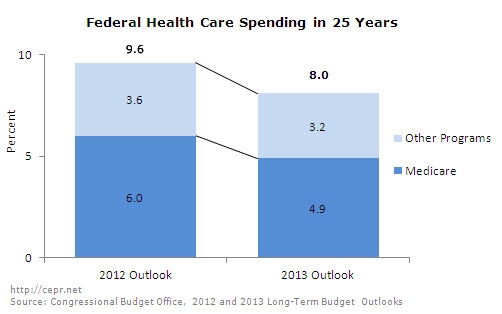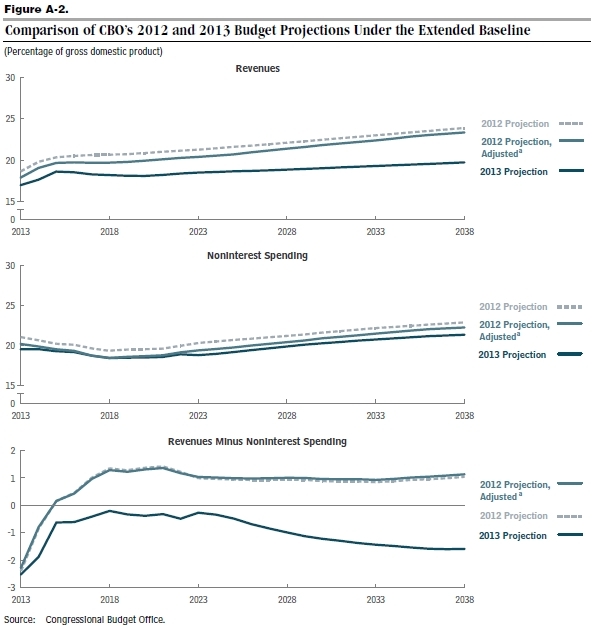CBO Says We Have a Tax Problem, Not a Spending Problem
by Guest Blogger, 9/18/2013

by Nicole Woo (originally posted on the Center for Economic and Policy Research's blog, CEPR Blog, on Sept. 18, 2013)
Yesterday the non-partisan Congressional Budget Office (CBO) released its 2013 Long-Term Budget Outlook, and it has some great news. Specifically, CBO is predicting substantially lower health care spending this year and 25 years into the future.
While last year CBO estimated that
federal spending for those [health care] programs would grow to 9.6 percent of GDP in 2037; in that year, 6.0 percent of GDP would be devoted to Medicare, and 3.6 percent would be spent on Medicaid, CHIP, and the exchange subsidies.
This year CBO projects
federal spending on the government’s major health care programs... would grow to 8.0 percent in 2038; in that year, 4.9 percent of GDP would be devoted to spending on Medicare... and 3.2 percent would be spent on Medicaid, CHIP, and the exchange subsidies.
Since increasing health care costs have long been considered one of the most intractable of our nation's future budget problems, CBO's new numbers should be cause for celebration.
On the other hand, CBO is projecting higher debt levels 25 years from now -- and finds that that it's mostly due to "sharply reduced" revenues going into government coffers:
The Congressional Budget Office (CBO) now projects that... federal debt held by the public would rise significantly in the next quarter century.... The very large change between this year and last year in projected federal debt stems primarily from changes in tax law that have sharply reduced future revenues.
CBO specifies that The American Taxpayer Relief Act of 2012 (which made permanent most of the Bush tax cuts and indexed the Alternative Minimum Tax to inflation) as the cause for the bulk of the decrease in taxes. As a result, it lowers its estimates of federal revenues a portion of our economy:
Federal revenues... are now expected to be substantially lower in coming decades.... By 2023, revenues are projected to be 2.8 percent of GDP lower than projected in the 2012 analysis: 18.5 percent of GDP rather than 21.3 percent.... Revenues are now projected to equal 19.7 percent of GDP in 2038, 4.2 percentage points lower than the 23.9 percent figure projected last year.
By lowering its projections of future spending levels as well, CBO shows that we have a tax problem, not a spending problem:
Noninterest spending... in 2038 is projected to be 1.4 percent of GDP lower than in the 2012 analysis.... Total federal spending on everything other than major health care programs, Social Security, and net interest is now projected to equal a smaller share of GDP throughout the next 25 years than CBO projected last year.
In addition, CBO quantifies how high unemployment rates do damage to the economy (and, by extention, future debt levels):
CBO raised its projection of the unemployment rate over the long term from 5.0 percent to 5.3 percent.... That change in the long-term unemployment rate reduced CBO’s projection of the level of GDP by about 0.6 percent after 2027.
Skimming over yesterday's news reports on the 2013 Outlook, it seems that most of the coverage missed the good news about health care spending, as well as CBO's important point that higher future debt is mostly due to lower taxes, not out-of-control spending.
That's a shame, as the public and policymakers need accurate information in order to make good decisions about our economy, now and in the future.





